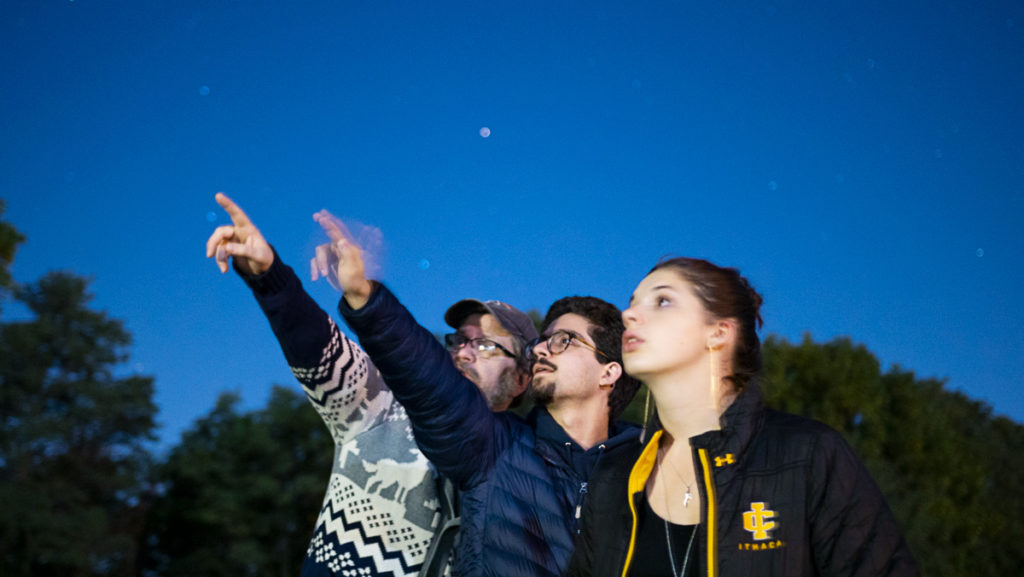Gazing up at Ithaca’s clear night skies, one may wonder what exactly is up there just beyond the stratosphere. For anyone curious to learn about the workings of the universe, the stars and the planet, Ithaca College’s new astronomy club is here to educate members.
Senior Mia Manzer, Astronomy Club president and co-founder, said the club’s leaders want to share their passion and engage students at the college with astronomy.
Manzer said the club will be holding biweekly meetings and will host different events, like movie nights, theme nights and star parties, which are outdoor observation nights. During the star parties, students will have the opportunity to use portable telescopes, look at constellations and learn about the universe beyond their lenses.
The club was created in Fall 2019 and is currently awaiting official recognition by the college, Manzer said.
Freshman Antara Sen, Astronomy Club secretary, said she is hoping to utilize the college’s Clinton B. Ford Observatory, a building on campus that is not currently in use, to hold open events for students and the greater Ithaca community. Sen said the club is going to host fundraisers to raise money to repair the observatory, but it does not have a set fundraising goal yet.
“We have a really good observatory that does not get as much usage as it could,” said Matthew Price, Astronomy Club adviser and associate professor in the Department of Physics and Astronomy.
Price said the club will be reaching out to students, alumni and faculty for donations to go toward repairing the observatory.
“The club itself supports the Ford telescope,” he said. “It supports outreach. It helps the students to help to do these things. It’s about taking the next step and getting everyone active.
Junior club member George Cozma said the club is looking to involve students in the refurbishing process for the observatory. He said the club may open up the observatory during repairs and have students come in to paint the panels of the observatory dome.
“We want to generate interest in the beginning,” Sen said. “We also want to keep that interest alive for the rest of the year.”
Cozma said that he is most excited to get the club fully recognized and to begin having regular meetings and hosting events and that planning club activities has been difficult. He said one of the greatest issues the club has is planning around unpredictable weather. The telescopes cannot be used in the rain or snow, so the outdoor star party events are subject to cancellation.
The club’s first star party was scheduled for Oct. 1 on the quad in front of Roy H. Park Hall but was canceled due to impending rain, Manzer said. The club is still working on rescheduling the first event, she said.
The telescopes, which are provided by the college, function better in colder temperatures, so the club will continue hosting outdoor events throughout the academic year and during the winter months as long as the weather permits, Sen said.
Manzer said her goal for the club is to promote engagement in astronomy from students outside of the college’s Department of Physics and Astronomy. Club meetings will be open to all students, and Manzer encourages anyone to attend regardless of their major or experience with astronomy.
“We want people to feel involved and be interested in learning about space and our universe and just have fun with it,” she said.
Sen said she believes all students could benefit from learning about astronomy. She said the club officials will help to teach and answer any questions inexperienced members may have.
“That’s why we’re building the Astronomy Club,” Sen said. “In our club meetings, we want to educate our members about the night sky and about the constellations and planets that we will be able to see.”
Price said the club is looking to engage the campus and act as an outlet for students who are interested in the topic and looking for help understanding the basics.
“The club can be campuswide,” he said. “It can recruit across the campus and help people be involved. The telescope can be used by any human who has an interest. They just need a little training.”
Sen said she believes the club offers useful information about astronomy and space exploration that students may not learn in their classes. She said that the club will make the topic more easily understood and will initiate discussions about current issues in the world.
“We have so many crises on earth right now, like the energy crisis,” she said. “There are so many things wrong right now, and I think that space exploration gives at least a new avenue for research, a new avenue for looking into something that not a lot of people have ventured into.”














